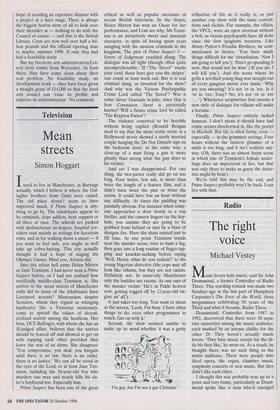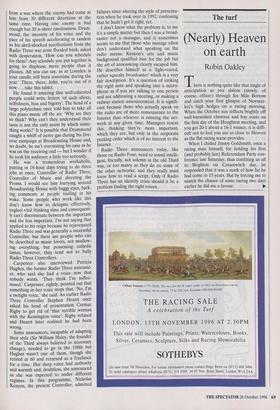Radio
The right voice
Michael Vestey
Music lovers hate music, said Sir John Drummond, a former Controller of Radio Three. This startling remark was made two Sundays ago in the last part of Humphrey Carpenter's The Envy of the World, three programmes celebrating 50 years of the Third and what it became, Radio Three.
Drummond, Controller from 1987 to 1992, discovered that there were 30 sepa- rate minorities among the music audience, each marked by an intense dislike for the other 29. They weren't actually music lovers: 'They hate music except for the lit- tle bit they like,' he went on. As a result, he thought there was no such thing as the music audience. There were people who liked opera, the organ, chamber music, symphony concerts or new music. But they didn't like each other.
I thought this was probably true up to a point and very funny, particularly as Drum- mond spoke like a man who'd emerged from a war where the enemy had come at him from 30 different directions at the same time. Having one enemy is bad enough but 30 is sheer carelessness. Drum- mond, the intensity of his voice and the pace of his speech accelerating in tandem as his shell-shocked recollections from the Radio Three war zone flooded back, asked with desperation, 'How can you schedule for them? Any schedule you put together is going to displease more people than it pleases. All you can say, as at Lourdes, is your candle will burn sometime during the year.' There, there, John, you're out of it now ... take this tablet.
He found it amazing that well-educated people could write letters 'of such idiocy, selfishness, bias and bigotry'. The head of a large polytechnic once told him to take all this piano music off the air. 'Why are they so thick? Why can't they understand their taste is not the only norm by which some- thing works?' It is possible that Drummond caught a whiff of nerve gas during his five- year campaign at Broadcasting House and, no doubt, he isn't overstating his case as he was on the receiving end — but I wonder if he took his audience a little too seriously.
He was a tremendous workaholic, putting in 18-hour days trying to do three jobs at once, Controller of Radio Three, Controller of Music and directing the Proms. I would see him hurrying around Broadcasting House with baggy eyes, bark- ing comments at people trailing in his wake. Some people who work like this don't know how to delegate effectively, neglect vital thinking time and consequent- ly can't discriminate between the important and the less important. I'm not saying that applied to his reign because he rejuvenated Radio Three and was generally a successful Controller, but there are people who can be described as music lovers, not swallow- ing everything, but possessing catholic tastes; however, they tend not to bully Radio Three Controllers.
Carpenter also interviewed Patricia Hughes, the former Radio Three announc- er, who said she had a voice now that nobody wants. 'They think I'm toffee- nosed.' Carpenter, rightly, pointed out that something in her voice stops that. 'No, I'm a twilight voice,' she said. An earlier Radio Three Controller Stephen Hearst once asked his head of presentation Cormac Rigby to get rid of 'that terrible woman with the Kensington voice'. Rigby refused and Hearst later realised he had been wrong.
Some announcers, incapable of adapting their style (Sir William Haley, the founder of the Third always believed in necessary change), needed to go in the 1980s but Hughes wasn't one of them, though she retired at 60 and returned as a freelance for a time. Her deep voice had authority and warmth and, doubtless, she announced as she was expected to under different regimes. In this programme, Nicholas Kenyon, the present Controller, admitted failures since altering the style of presenta- tion when he took over in 1992, confessing that he hadn't got it right, yet.
I don't know what the problem is; to me it's a simple matter but then I was a broad- caster not a manager, and it sometimes seems to me that those who manage often don't understand what speaking on the radio means. Kenyon's arts and music background qualified him for the job but the art of announcing clearly escaped him. He describes himself as a 'light-voiced, rather squeaky broadcaster' which is a very fair description. It's a question of striking the right note and speaking into a micro- phone as if you are talking to one person and not addressing a meeting, or making a railway station announcement. It is signifi- cant because those who actually speak on the radio are of more consequence to the listener than whoever is running the net- work at any given time. Managers resent this, thinking they're more important, which they are, but only in the corporate pecking order which is of no interest to the listener.
Radio Three announcers today, like those on Radio Four, need to sound intelli- gent, friendly, not solemn in the old Third way, or too matey as they do on some of the other networks; and they really must know how to read a script. Only if Radio Three has an identity crisis should it be a problem finding the right voices.



















































































 Previous page
Previous page